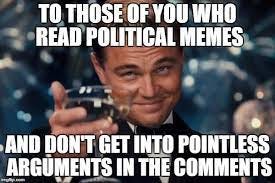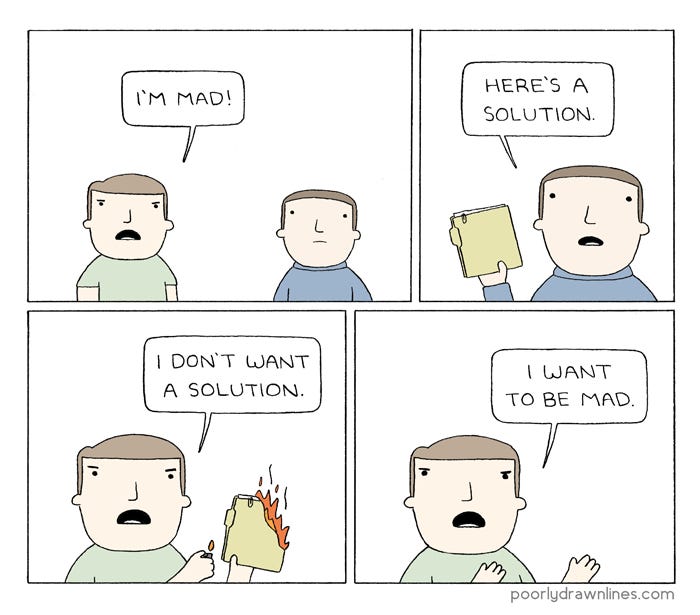I pushed her. She screamed. I was in disbelief.
This wasn’t when I was a child, this was recently. A friend posted about the Israel-Hamas conflict on her instagram story. I asked a question. She responded “...just say you’re a lil racist and go lol”
I tried to put out the fire and reach out an olive branch only to receive more screaming.
I don’t blame her. I’m not mad at her at all. I understand social media has conditioned this generation to think and act in extreme ways. Correction - to think never and act in extreme ways.
Social Media Kills Our Thinking
Social Media has made it harder than ever to think independently. Yes, because we’re constantly distracted by it and never bored enough to think. But also for more discreet reasons. Because of social media…
Consistency Bias is Multiplied Exponentially
Ideological extremism is a Win-Win
Availability Cascades are on Crack
Before going deeper into each, here’s a quick explanation.
Consistency Bias is a psychology term and it’s often used in marketing. It’s the theory that once a person commits to something in some way, they are more likely to continue to agree to actions that are consistent with the original task.
Ideological Extremism is a win-win for people consuming media and people running media. Consumers get false comfort and media owners get to print money.
Availability Cascades happen when a lot of people start to believe in something more because it's being talked about a lot. This belief gets stronger and more people believe it because they hear it everywhere.
Consistency Bias
Once we share an opinion, we are stuck to it.
Understanding Consistency Bias
According to Dr. Robert Cialdini, the world leader in the science of influence and persuasion, the larger and more public a commitment, the more likely people are to adhere to it.
For example, if I agree to put up a small lawn sign with the name of my preferred political party, I’m then more likely to agree when asked to show support at their rally.
This is a tactic long used by professional marketers, salesmen and political campaigners to influence people, but we used to be limited in the size and audience of our statements. If I tell a salesman that I like Mercedes, HE knows I said that and can use it against me. But nobody else can.
Today, I can commit my support for a cause (even one I know nothing about) to nearly every single person I know and have ever met by simply clicking “share” on an infographic a friend posted.
The issue here isn’t that a thousand crafty salesmen are gonna pop up and come sell me stuff I don’t want. The issue with being so public is that we know our reputation will be hurt if we now change our minds on the issue. We know the damage we’ll take because we see it happen to our politicians constantly.
Consistency Bias in Politics
It used to be that the only people with large audiences to make their opinions known to strangers were politicians, radio hosts and authors. For now, I’ll focus on politicians because they regularly needed to share their opinions on many topics (similar to University students today, but more on that later).
Flip flopper is a term that dates back to 1890 when John W. Goff, a New York district attorney, used it to slander his opponent when he changed his mind on an issue. Since then, it’s been used in political campaigns constantly. In theory, we want our leaders to change their opinions when they learn new information, but in practice it’s unnerving - because then we don’t know who our allies are.
Another way this applies to politics is in political campaigning. People feel compelled to bombard comment sections of videos they disagree with, share content promoting their preferred candidate and “pick sides”. Word to the wise - once someone has posted their stance, you are wasting your time trying to convince them they’re wrong. They have too much on the line now that they’ve posted online.
To make the average person change their public opinion, you don’t need to convince them that they’re wrong. You need to convince them that they are so unbelievably wrong. And that still probably won’t do it. Your only hope is that they’re not average people, they have high self-esteem and most importantly, they have very few “views” on whatever they posted.
Extremism is a Short Term Win-Win
Win for “The People”: Who do we know for sure will always be our ally? The person who believes in “the cause” even more than we do.
If I’m anti-abortion, and my local representative is a level-headed, analytical thinker, I’m worried he might change his mind over time. If my local rep is more “extreme” than me, I believe it’s unlikely he’ll get new information and become pro-abortion for two reasons:
Massive consistency bias - they would look so stupid and lose all credibility if they flip flopped
They “believe” in it even more than me and I’m not changing my mind, so neither will they
The more “far X” you are, the more reliable you are to not change. Nobody would bet on AOC suddenly changing her stance on immigration or “Medicare For All”. Nobody would bet on Trump saying “well actually maybe we don’t need a wall” (although if you do want to bet, I’ll take you up on that 1,000,000:1)
Reliability is so important because generally, most people pick 2-3 issues that they really care about. No everyday person has time to care about affordable housing, medicare accessibility, immigration, foreign affairs, woke-in-school, abortion and the entire spectrum
More typical today is a person who cares about abortion and wokeness (whether that is pushed/decided by “the media” is for another day) and thinks very little about foreign affairs (except when things go wrong i.e Russia-Ukraine, Israel-Palestine)
Win for Media Outlets: Extreme news is more captivating. It does three key things that allow media companies to charge advertisers more:
keeps people on their media site
Increases “shareability” of content
Increases engagement
Not that complicated - very clear why Twitter is incentivized to tell me every time someone commits a hate crime against Jewish people. It makes me click, comment and maybe even share with an angry caption.
Availability Cascade and Opinions on Everything
Availability cascades were coined by Timur Kuran and Cass Sunstein in this paper. It’s a mix of the Availability Bias and Information Cascades:
Availability Bias: the more available an idea or piece of evidence in our brain, the more importance we assign to it
Information Cascades: when a person makes a decision based solely on the decisions of other people, not based on their own prior knowledge
Availability Cascade Example: A rumor at school gets told so much that everyone starts to believe it's true. They hear it, making it very available. Then, they see everyone else acting as if it's true, making the decisions of others apparent. Then it's a perpetuating loop and the rumor is now considered true.
Availability cascades make it painfully easy to avoid thinking and believe what you see. In fact, you probably won’t even notice it. You’ll simply take what you’re constantly seeing as fact. If you see the same story reposted a hundred times, unless you’re committed to disbelieving it, you’ll fall for it. By seeing controversy as “facts” and not considering the complexities of a situation, you’re prone to say things like “your silence is deafening”. You cannot understand why a bystander would not want to remain a bystander. The situation is so clear to you.
“Your silence is deafening”
Yes, it is important to stand up for others who are being wrongfully targeted/treated etc
No, giving heavily biased and one-sided explanations to a friend and telling them to take a stance is not important
Yes, it’s important to exercise your right to free speech BUT it’s also important to NOT exercise that right sometimes
No, your non-X friends have no responsibility to “educate themselves”. Nobody actually wants other people to educate themselves. Telling people to “educate themselves” on a topic is just a way to say “if you were smart you would agree with me”. It’s not about education. You can tell because if those same people returned after educating themselves and disagreed with you, you would still imagine they’re not properly educated, or else plain hateful.
Remember the same availability cascades don’t happen to everyone. Without considering another person’s media exposure, it’s impossible to break bread. You will forever by arguing with different facts. Sad but true.
There is a BRIGHT Side
No way, Noah! A benefit to social media?! Yes!
Independent Media Production
The democratization of media has created a million options for people choosing where to get their news and information from. For example, you’re reading Noah Sochaczevski’s BigNerd substack. You only have the ability to read this because it was so easy for me to make a SubStack account, broadcast that it exists and share my ideas here.
Before social media, this experience you’re having now would have been infinitely harder. Your options for learning were: school, books at the library, the newspaper and news stations. These are all much harder spaces to publish in. That means the only people teaching classes, writing books, editing newspapers, and broadcasting on television were relying on somebody else who has a lot of money to support them. Printing books, delivering newspapers and getting camera equipment isn’t cheap.
Now that the bar is lowered to publish our thoughts, smart people doing other things can also write. There is less control of what is and isn’t said or written. That comes with the challenge of figuring out who is a credible source and who is not. That sucks. But it’s a better problem to have.
There’s Still Hope
I’m keeping a positive note as I finish up. We spoke about three major ways that social media affects our thinking - well here’s three ways to fight it:
Confirmation Bias: be hyper-aware of what you post in your name. Your reputation is important to you. Saying less is safer than saying more. Don’t post until you’re completely sure of your opinion. Or, even safer, don’t post about controversial topics.
Extremism: find independent media sources. Use substack, instagram, blogs and anything else to find specific people who you trust. These people are less likely to be dependent on advertising revenue for their livelihood. Therefore, they’re also less likely to share inauthentically extreme views to “get a rise out of you”.
Availability Cascades: have a new slogan “guilty until proven innocent”. Assume everything you see is false until you can prove it’s true. Don’t be outwardly obnoxious about it but be internally vigilant. Assuming the overly-emotional simplifications of a complex topic that fit in an instagram post are false is usually closer to the truth anyways. If you feel compelled, do your own research after. But remember, you don’t need an opinion on everything. Sometimes you can “sit this one out”
I hope you enjoyed! Please share with a friend who you think might enjoy this piece.
Noah





Noah never misses love picking up the quick knowledge! It’s impossible these days to get bored and start thinking.
Well said. Social media is a force to be reckoned with.